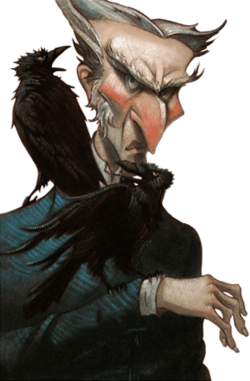
Villains in children’s stories often wind up played for laughs rather than menace. The idea, I think, is to teach children that being selfish and mean isn’t glamorous or cool, and that good always triumphs. Of course, as adults we know this isn’t always the case, and sometimes the bad guys do win. Daniel Handler (aka Lemony Snicket) seemed to want to teach this lesson at a younger age in A Series of Unfortunate Events, and with this in mind, created Count Olaf.
When their home is burned down and their parents killed in the fire, the Baudelaire siblings are sent to live with Olaf, a nasty, hateful drunk who abuses the children, barely feeds them, treats them as slave labor, and mocks them often for their stupidity and uselessness, despite the fact that they are neither. He is always surrounded by his theater troupe, a cadre of freaks and criminals who readily do his bidding. It soon becomes clear that Olaf intends to murder the children and gain access to their parents’ fortune, and while they manage to outwit him, Olaf escapes time and again, continually ruining their lives and keeping them on the run.
In the interest of fairness, Olaf does have some traits of a silly children’s villain: he has poor hygiene, he loves to write and act in plays, but is terrible at both, he has a poor vocabulary, often mixing up words even the children know, and his disguises, while they seem to fool a lot of adults, are usually rather transparent, particularly to the Baudelaire orphans. Despite this, he is still a serious threat, and commits genuinely horrible actions on a regular basis, including the murders of several guardians willing to care for the children, the torture and starvation of various animals, and the starting of numerous fires, which resulted in the deaths of many people whose fortunes he was after. It is even suggested (though never confirmed, as the series leaves much ambiguous) that Olaf started the civil war in the Volunteer Fire Department, which through the course of the series his destructive faction seemed to be winning. He also hints at acts in his past rather casually that are quite horrifying, such as throwing tacks into a baby’s crib.
As to Olaf’s motivations, the series offers hints, but not a great deal of resolution. It seems that he was raised among the VFD, as were many of the adults in the series, and was taught their various codes and secrets, as well as their knowledge of fire-starting and stopping techniques. He is believed to have a connection to the Baudelaire orphans’ mother Beatrice, which may be why he pursues the orphans so vigorously. While he is obviously motivated by some level of greed, there would likely be easier ways to gain money for a criminal like him rather than his endless attempts to murder three children. Therefore, it seems to me that it is at least somewhat personal, as though the children were a reminder of something he had lost, or felt he had in any case. While the later books seem to suggest that Olaf was made into a monster, it is obvious at least that he took to it extremely well.
In his final moments, Olaf does perform a single act of decency, in helping the dying Kit Snicket to deliver her baby rather than find some way to survive himself. He seems to have some fondness for Kit, despite the fact that he is also responsible for her death. It’s hardly enough to make of him a better person, and indeed he refuses to apologize for anything he has done, even in the end. Still, his small moments of humanity are at least food for thought as to the nature of evil, implying that even the worst people are not monsters all of the time.
Count Olaf manages to be both a caricature of a villain and a particularly nasty legitimate villain at the same time. A Series of Unfortunate Events is a fairly dense series as children’s books go, filled with all manner of references, allusions, and symbols, not all of which are obvious or clear, but one of the more obvious lessons inherent in the series is the idea that the world is dangerous, especially for kids. Olaf is the foremost representation of this danger, and despite the fact that he tends to be rather obvious to the orphans, most of the adults in the world are of little to no help. It’s a small leap to take from this the idea that there is no guarantee of safety in the world, and most of the time we are on our own to deal with our problems. Not exactly a happy lesson, but an important one nonetheless.
